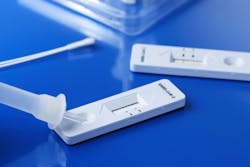Repeat testing with a rapid antigen test may be required to rule out SARS-CoV-2 infection
A prospective cohort study found that repeat testing in 48-hour intervals with a rapid antigen test (Ag-RDT) may be required to rule out SARS-CoV-2 infection. This means that people testing for SARS-CoV-2 should exercise caution in public settings despite an initial negative result if they suspect they may be infected or have been exposed. The findings are published in Annals of Internal Medicine.
Researchers from the University of Massachusetts Chan Medical School studied 5,353 participants who were asymptomatic and negative for SARS-CoV-2 study day 1 to evaluate the performance of Ag-RDTs. Ag-RDTs were collected at home and reverse transcriptase polymerase chain reaction (RT-PCR) tests were shipped to a central laboratory for analysis. The sensitivity of Ag-RDTs was measured on the basis of testing once (same-day), twice (after 48 hours), and thrice (after 96 hours). Using the PCR test as a comparison, the data showed that the performance of the rapid test was optimized when asymptomatic participants tested 3 times at 48-hour intervals and when symptomatic participants tested 2 times at the same interval. False-positive rates were low for rapid tests, suggesting that repeat testing is not needed for those obtaining a positive result on the first or second try. While testing, people should continue to practice mask wearing and social distancing until infection is ruled out.

